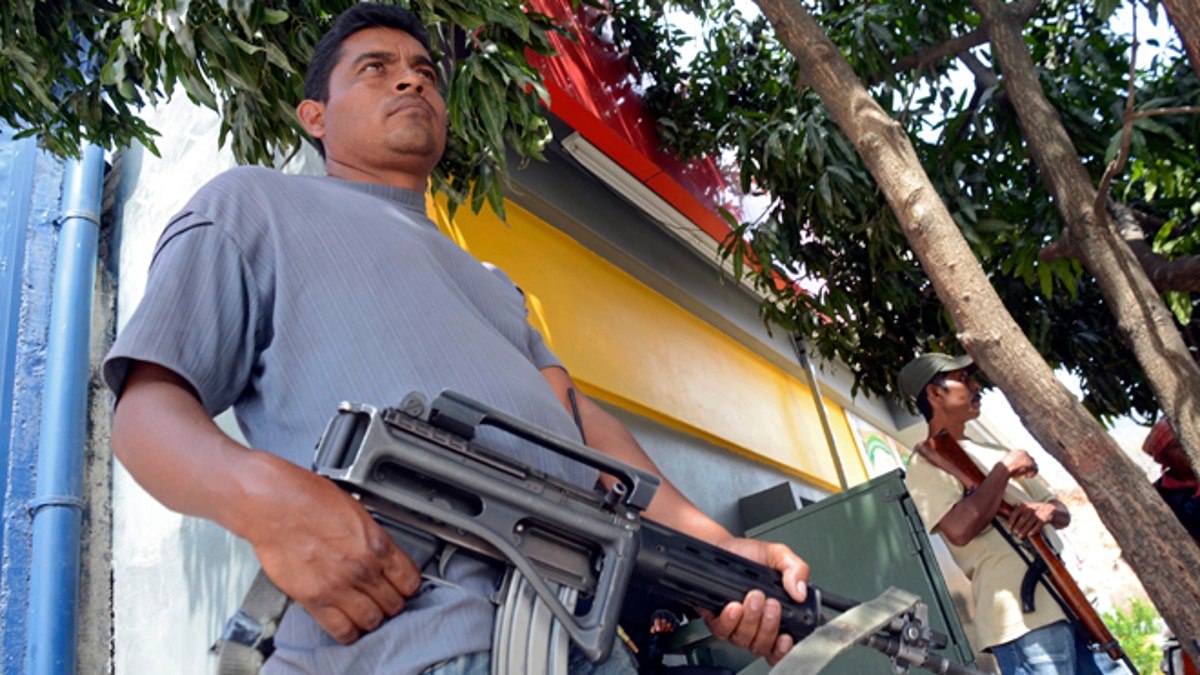
A group of armed vigilantes stand at the entrance to the town of Tierra Colorada, Mexico, Wednesday, March 27, 2013. Hundreds of armed vigilantes have taken control of this town on a major highway in the Pacific coast state of Guerrero, arresting local police officers and searching homes after a vigilante leader was killed. Several opened fire on a car of Mexican tourists headed to the beach for Easter week. (AP Photo/Bernandino Hernandez) (AP2013)
After one of their leaders was killed, hundreds of armed vigilantes have taken control of a town on a major highway in the Pacific coast state of Guerrero, arresting local police officers, searching homes and some opening fire on a car of Mexican tourists headed to the beach for Easter week.
Members of the area's self-described "community police" say more than 1,500 members of the force were stopping traffic Wednesday at improvised checkpoints in the town of Tierra Colorado, which sits on the highway connecting Mexico City to Acapulco. They arrested 12 police and the former director of public security in the town after a leader of the state's vigilante movement was slain on Monday.
A group of tourists heading to the beach were shot at by vigilantes after they refused to stop at a roadblock. One was slightly wounded.
The vigilantes have opened fire before on motorists who refused to stop, slightly wounding a pair of tourists from Mexico City who were visiting a local beach in early February.
The groups say they are fighting violence, kidnappings and extortions carried out by drug cartels, but concerns have surfaced that the vigilantes may be violating the law, trampling the human rights of people they detain, or even cooperating with criminals in some cases.
Sensitive over their lack of ability to enforce public safety in rural areas, official have largely tolerated vigilante groups.
The vigilantes accuse former security director of Tierra Colorado of participating in the killing of vigilante leader Guadalupe Quinones Carbajal, 28, on behalf of local organized crime groups and dumping his body in a nearby town on Monday. They reported seizing several high-powered rifles from his car, and vigilantes were seen toting a number of sophisticated assault rifles on Wednesday, although it was not clear if all had been taken from the ex-security director's car.
"We have besieged the municipality, because here criminals operate with impunity in broad daylight, in view of municipal authorities. We have detained the director of public security because he is involved with criminals and he knows who killed our commander," said Bruno Placido Valerio, a spokesman for the vigilante group.
Placido said vigilantes had searched a number of homes in the town and seized drugs from some. They turned over the ex-security director and police officers to state prosecutors, who agreed to investigate their alleged ties to organized crime.
The growing movement of "self-defense" vigilante groups has seen masked townspeople throw up checkpoints in several parts of southern and western Mexico, stopping passing motorists to search for weapons or people whose names are on hand-written lists of "suspects" wanted for crimes like theft and extortion.
There has been growing debate within the Mexican government over the legality of the vigilante groups, with the governor of Acapulco’s home state, Guerrero, calling for the legitimization of the armed groups in the tradition of the state’s autonomous community police forces.
The proposal by Guerrero Governor Angel Aguirre is controversial as it could create more tension between local authorities and the vigilantes as well as putting governors in neighboring states in a precarious position. Armed militias have also formed in the states of Veracruz and Michoacán, where authorities arrested members of an alleged vigilante group who actually worked as strongmen for drug cartels.
Vigilante groups date back to the early 1990s when a wave of violence in Mexico forced many communities to form their own “self-defense” groups, including a the Regional Coordinator of Community Authorities (CRAC) in Guerrero, which still exists in today in a legal gray area and consists mainly of members of the state’s indigenous community. The group wears uniforms, carry credentials and have received training in law enforcement, but questions over their legality and professionalism still remain.
The Zapatistas, a “self defense” group that formed in the midst of the implementation of the North American Free Trade Agreement in 1994, declared their autonomy in a peaceful but armed uprising. The group eventually won the right for indigenous communities independently in the southern Chiapas state top govern themselves.
Aguirre said that his proposal would prohibit the use of masks and limit the weapons self-defense groups could carry.
Many in Mexico have blamed the federal and state governments’ lack of ability to keep peace for the rise in the vigilante groups.
“The worst path is the duplication of these armed groups because it reproduces violence,” Mr. López said Ernesto López Portillo, director of the Mexico City-based Institute for Security and Democracy, according to the Christian Science Monitor. “The risk," he says, is giving legal authorization to armed groups that "still don’t represent a professionally designed police force."The Associated Press contributed to this report.
Follow us on twitter.com/foxnewslatino
Like us at facebook.com/foxnewslatino
